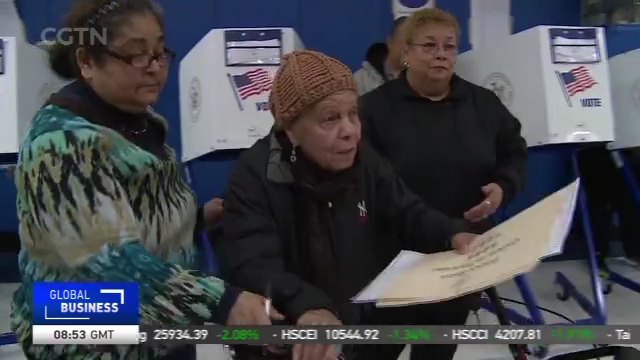
19:04, 05-Nov-2018
US Midterm Elections 2018: Growing income inequality pushes voters to polls
Updated
18:02, 08-Nov-2018
02:33

As the 2018 U.S. midterm elections approach, the US economy remains buoyant and with the country's unemployment rate nearing historic lows. But the rosy picture belies an expanding gap between the rich and the poor, a result of stagnant wages and income inequality. Our correspondent Nick Harper is in New York, where that disparity is particularly acute.
Geographically, Sunset Park is just a few miles from Manhattan. But economically, there's a very clear divide between here and the towers of Wall Street. Sylvia Morse helps many of the neighborhood's hourly workers, members of the largely immigrant community who get by from various low-income jobs.
SYLVIA MORSE PROJECT MANAGEMENT, CENTER FOR FAMILY LIFE "How to start a business, how to get better work, how the economy really works, that information is often withheld from low wage workers and immigrant workers and women. And so we're really helping people build the knowledge and skills to be able to increase their earnings."
The center encourages workers to form cooperatives to provide them safety in numbers, better pay and improve working conditions. But research shows the gap between the haves and have-nots is getting wider.
NICK HARPER NEW YORK "Two separate studies recently found New York has some of the worst income inequality rates in America. The city ranks second in the nation, while the state tops the list with the greatest divide, New York's one percent earning 44 times more than the state's other 99 percent."
A UN report found 40 million Americans, more than 12% of the population, live in poverty. While in New York City as many as one in seven struggle with hunger, many of them relying on food pantries. Economists say the city's high cost of living and limited wage growth means people here aren't seeing the benefits of a stronger economy.
JONATHAN MORDUCH PROFESSOR OF PUBLIC POLICY & ECONOMICS, NEW YORK UNIVERSITY "We ought to see wages rising as unemployment goes down. There should be pressure in the labor market which starts pushing wages up. But they aren't rising in the ways that we expect. And on the low end that means after inflation wages basically haven't moved in decades now."
While the economy remains strong, the lingering issues of wages and income inequality could push more people here to the polls. Nick Harper, CGTN, New York.

SITEMAP
Copyright © 2018 CGTN. Beijing ICP prepared NO.16065310-3
Copyright © 2018 CGTN. Beijing ICP prepared NO.16065310-3